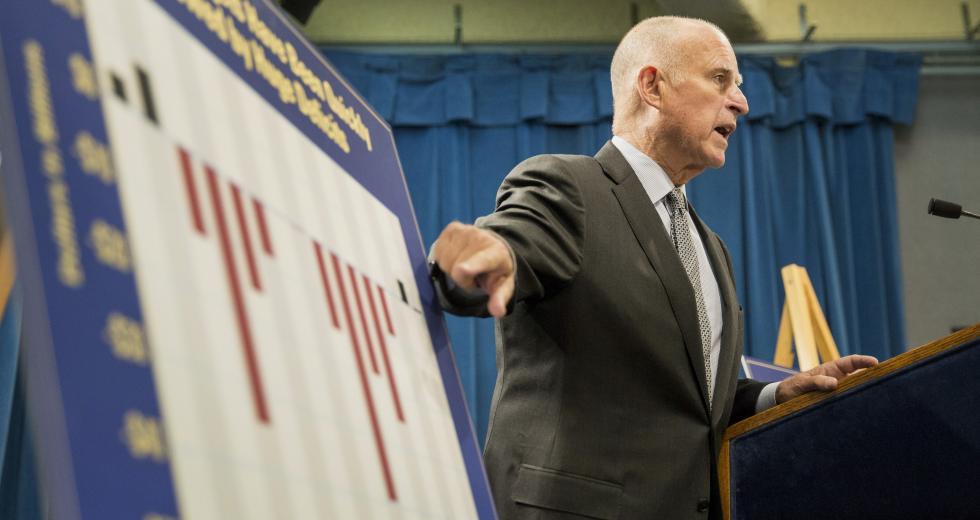Governor Jerry Brown convinced voters in 2012 they had to raise taxes if they wanted to avoid Draconian cuts to schools. It was temporary, he said. Now, as state coffers are heavy with surplus revenue, advocacy groups and organized labor want to keep the levies in place.
The proponents, including teacher and state worker unions, have launched campaigns to qualify two separate initiatives on the statewide ballot to either extend the taxes through the next decade or make some permanent — while raising those levied on the wealthy even more. They want to spend the money on schools and programs for the poor.
The two groups likely will have to battle each other over what is expected to be a crowded California ballot in November 2016, when voters also choose the next U.S. president. They will have to convince a reluctant electorate and staunch opposition from businesses and Republicans that letting the taxes expire would expose the state to the kinds of deep budget cuts and financial morass that dogged California for much of the last decade.
“It’s one of the most important fiscal questions that the state faces,” said Mark Baldassare, president of the Public Policy Institute of California, a nonprofit group that provides polling and research. “The big question is: What happens when those funds are no longer available because the tax will expire?”
Three years ago, voters in California approved Brown’s Proposition 30 to raise an estimated $6 billion annually by temporarily boosting income and sales taxes. At the time, California faced a $9 billion budget shortfall, one in a run of deficits that exceeded $100 billion combined since 2007.
The measure added $15.2 billion to state coffers in the two budget years ending in June, according to data from Brown’s finance department.
Brown, who has said the taxes should expire, has warned all along that the money was fleeting and has bolstered the state’s rainy-day fund to prepare for when the spigot turns off at the end of 2018. Brown’s spokesman Evan Westrup declined to comment on the latest proposals.
One ballot proposal filed this week would make permanent the tax increases on the wealthy, including a 10.3 percent rate on those earning at least $290,000 and adding a new “super- earner” tax of at least 13.3 percent on couples who earn more than $2 million a year.
Another plan would extend the higher income taxes approved under Brown until 2030.
“Proposition 30 has been enormously successful in terms of increasing money for schools and avoiding drastic cuts,” said Dan Newman, a spokesman for San Francisco-based SCN Strategies, which is running one of the ballot campaigns and which led the Prop. 30 push and Brown’s re-election campaign. “There does seem to be a broad consensus of support for funding schools and health care in a budget-smart way.”
If approved, higher taxes could spur even more demand for California’s tax-exempt bonds, which have rallied as a government once infamous for budget shortfalls has reaped the benefits of the fast-growing economy. Ten-year California bonds yield have slipped to about 2.5 percent, about a quarter percentage point more than top-rated securities, according to data compiled by Bloomberg. That gap, a measure of the added yield that investors demand to compensate them for the risk, is less than half what it was in June 2013.
Appearing on the same ballot as a presidential election could aid passage, as more people in a state where Democrats outnumber Republicans are expected to vote compared to a mid- term cycle.
“This initiative is going to be in the company of 10 to 15 other initiatives, on top of a presidential election, on top of a Senate election,” said Bill Whalen, a research fellow at Stanford University and speech writer to former California Governor Pete Wilson.
“That’s going to be a lot of information flying around for people,” he said. “It will be difficult for people to focus on that one initiative as a source of good or a source of bad, and that probably increases its chances of passing ultimately.”
Already, foes are lining up to oppose the initiatives.
California’s high tax rates are driving out the wealthy and middle-class workers, said Jon Coupal, president of the Howard Jarvis Taxpayers Association, a Sacramento group that supports limited taxes. He said he plans to oppose the proposals.
“We have seen substantial capital flight out of California in large part because of these high income tax rate brackets,” Coupal said. “Given the fact that the state budget is in a surplus, we see no justification to extend those very punitive tax rates.”



